Easy Green: The One Bag of Trash Challenge
This post is the second installment of the Easy Green series by guest contributor Jo Hegerty of Down to Earth Mother.
If you want to live more lightly on this earth, the first place to start is your rubbish bin. By focusing on waste you
- Become more aware of what you consume
- Get measurable results for your efforts
- Nurture lifelong habits in the next generation.
For these reasons, I present you with the following challenge: to reduce your family’s rubbish to just one small bag per week.
I know – yikes! If bin day to you means hauling an over-stuffed Otto to the kerb, you might be thinking this is an impossible task. But it can be done. Here is a step-by-step approach to reducing the rubbish your family sends to landfill.
Step 1: Get the family on board
Talk to your children about the challenge and ask for their ideas on how to reduce rubbish. As environmental education in schools continues to improve, chances are the kids will be able to teach you a thing or two! Share with them your plan, using the steps below and ask if they’d like to help (I’d bet money on the fact they will), or together develop your own strategy. A greater challenge may be your other half, whose lifelong habits may be more difficult to break. Here are my tips for dealing with a sceptical spouse.
Step 2: Deal with food waste
Even if you never make it past this step, addressing food waste will make a huge difference. Around 40% of the stuff in our bins is food. We’re talking veggie peelings, bread crusts, uneaten dinner, coffee grinds and the stuff you sweep off the floor eight times a day.
Your options for disposing of food waste are compost, worm farming, and chickens or other pets. Unfortunately no one option will provide the answer to all your food waste (worms don’t like lemons or onions, for example), but incorporating just one of these systems into your home will have an instant effect. Choose what’s right for you. We have a “worm farm, compost heap, chooks and dog” system, which is a little crazy but means we have absolutely no food items going into our bin.
Learn how to create a compost system here and a fun worm farm here. You may also want to check out 10 things you didn’t know you could compost.
If you live in an apartment or rent, don’t despair! Worm farms are compact and don’t smell, or you can use a Bokashi bucket to dispose of your food scraps. All you need is someone with a garden to take the nutrient-rich peat every now and then.
Step 3: Rethink Waste
With your food scraps sorted, it’s time to look at the other 60% of things in your trash. From now on, there is no such thing as rubbish. Talk to your family about everything that passes from our hands to the bin. What is it made of? Can it be used again? Can its components be recycled? Food scraps are organic matter that can nourish the soil (or a chicken or a hungry pet), bottles can be reused or recycled, most packaging can be recycled somehow. The only things going into your rubbish bin should be those that have absolutely no further use.
Step 4: Reorganise Your Rubbish
The difference between something being recycled and lying in landfill can be as simple as having the right receptacle at hand! Dedicate a space in your kitchen to kerbside recyclables – a medium-sized box on a shelf in the pantry will do – and make sure the whole family knows what goes in here (your council may be able to provide a sticker or you could help the kids make a sign using pictures from magazines).
As you move from being a family that throws everything into one bin to a family that sorts its waste, your system will evolve and you may need more boxes. Be sure to label them all so there’s no confusion.
Step 5: Take recycling to the next level
At my place, in addition to the fortnightly recycling of glass, paper and plastic containers, we collect soft plastics to take to Coles supermarkets, batteries, toothpaste tubes and the triggers from cleaning products (see here for details). In Australia, make use of Planet Ark’s website – find out which programs are available to you, start collecting and watch your rubbish shrink.
Step 6: Reduce the rubbish that comes into your home
You may wonder why this isn’t the first step but, I believe reducing your waste is a process. Once you have your system set up and have been using it for a while, you become more aware of what constitutes true rubbish. With this newfound awareness, you and your family can take one look at an over-packaged food item or cheap toy destined for landfill and choose to say “no thanks”.
Here are some other tips on reducing waste:
- Buy pantry staples in bulk
- Avoid individually-wrapped snacks
- Consider switching to reusable nappies (or work on reducing the impact of disposable nappies)
- Mulch or compost garden waste and lawn clippings
- Choose reusable products, such as water bottles
- Reuse paper and cardboard packaging for craft
- Stick to a list when you shop to avoid buying excess food
- Avoid vegetables or meat packed on foam trays
- Shop at markets (remembering to take your own bags)
- Buy from bulk-food stores and take your own containers
Note that there is no timeline to this challenge. It could take you weeks or months to reduce your waste to one small bag. So what? It’s a process – the changes you make are more sustainable if introduced gradually. Do what’s right for your family, remembering the green living mantra: “start where you are, do what you can.”
But why bother?
Tullamarine Landfill Photo credit: mugley via photopin cc
Tim Silverwood, co-founder of environmental charity Take 3, likes to point out that nature does not produce waste. Humans are unique in that we create this pile of stuff we call rubbish that we don’t really know what to do with. Until now, the answer has been to bury it in the ground, but there are big issues with this, from the production of methane gas, which is 21 times more dangerous to our climate than CO2, to the simple fact that we’re running out of space (it’s estimated the UK has just four more years of landfill space available).
As well as being a problem in it’s own right, waste represents a host of other issues that affect our natural environment: our use-it-once-and-chuck-it-away culture, the tendency to consume more than we need, and a lack of respect for the resources used to make our things and the food we eat, to name just a few.
So are you willing to take the One Bag of Trash Challenge? Let us know what’s filling your bin up and how you’re going to reduce it!
Check out the Easy Green series – simple suggestions for reducing your family’s impact on the environment and saving cash at the same time!

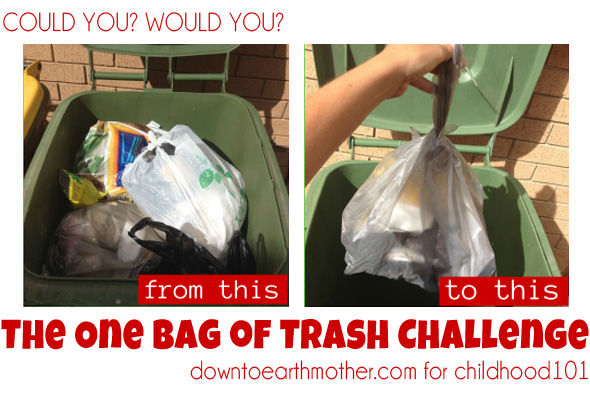
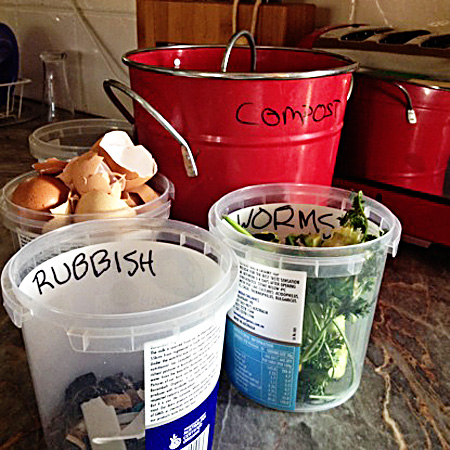
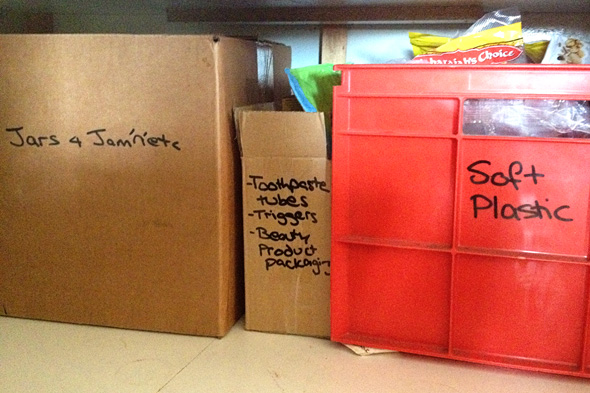
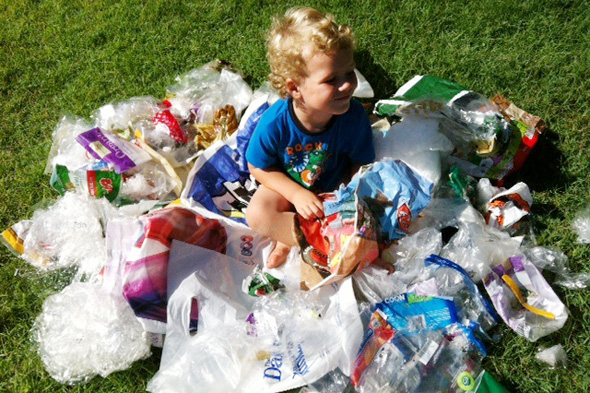
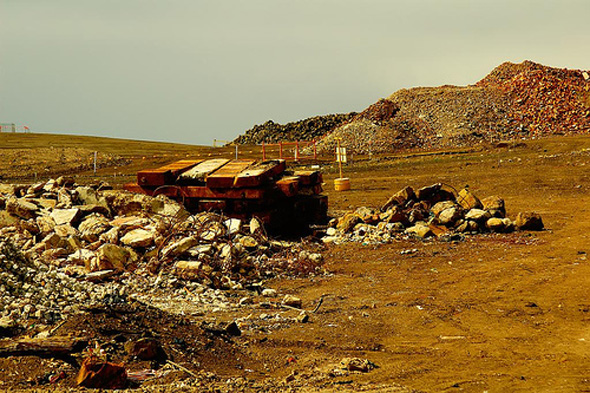
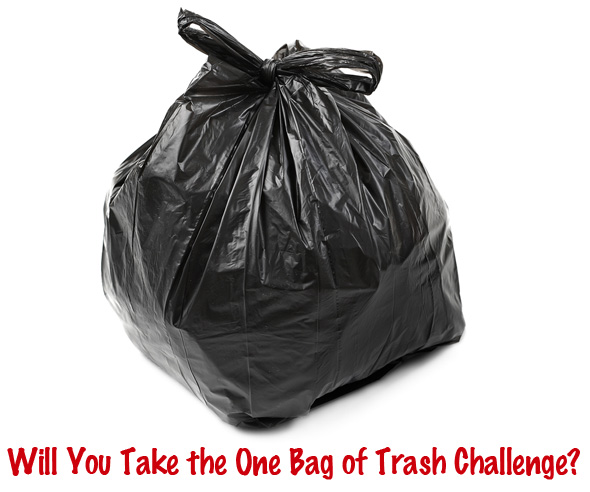

What a great easy to follow article! I couldn’t believe how much our waste was reduced from adding a compost and of course from recycling. Easy to implement and it can make an unbelievable difference!
Thanks Kristie for your kind words. An increasing number of items of packaging can be recycled these days, it’s always worth checking the bottom of foam meat trays, and even some soft plastic bags, like pasta packaging, will show the recycle symbol these days.
Some great tips Jo 🙂 We really noticed a difference to our rubbish bin when our council introduced a split bin system – our recycling bin would be completely full at the end of each fortnight yet our rubbish bin would only be a quarter full if that. Having a smaller container inside definitely helps make things easy. Ours lives under the sink (it’s just a tub from IKEA), when it’s full, I take it outside and empty it. We don’t have to sort our recycling either = easier still. Now we have a compost bin and a dog 😉 Would love some chooks too – the perfect recyclers!
Chooks are the perfect recyclers, although mine are pretty fussy! I so love to see councils issue teeny tiny rubbish bins and larger recycling bins so people would think twice about what they throw out!
Ours has always been low since we use cloth nappies, recycle and are fairly ‘non packet food’ consumers… however, it’s been even BETTER since we’ve been recycling our soft plastics!! I can’t believe how much we still have but so pleased it’s being recycled!
Thanks for another great reminder!
Thanks Bek. Cloth nappies make a huge difference to rubbish output when you have little ones and they’re really not that much of a hassle, are they? I have used mine for four years and I absolutely love them. On the occasions (usually sickness-related) I’ve switched to disposables I can’t believe how quickly the bin fills up.
Thanks for sharing this – I hadn’t found Terracycle before – now we have a way to recycle even more of our waste! Brilliant!
In the US Terracycle even has a program for recycling cigarette butts. A truly great company that definitely deserves our support.
Jo, you are my go to girl for all things eco! Such great, easy tips to take on board! x
Thanks Sonia! Always happy to talk trash… 🙂 x
This list is really so wonderfully helpful. There are some things that I think I do really well, like limiting the rubbish we bring into the home and re-using packaging…but there is one thing I know I need to work on, and I feel quite guilty about it. It’s the composting. We have a small outdoor play space and I’m so scared the compost will bring rats and mice. Is that a myth? If not, is there something you can do to avoid that?
Jackie, I’d love to tell you that it’s easy to keep mice out of your compost but even if you’re diligent about keeping meat, dairy and oil out of the compost, they’ll still find it. For years now, we’ve had a mouse that lives in the compost (not the same one!) and it hasn’t really been a problem. Now the compost is closer to the house I’m more inclined to chase them away or let the dog do it for me. To manage mice (I’ve not yet seen a rat), your need to turn the compost regularly, add dry ingredients and generally work on your compost heap so it’s breaking down nice and quickly. Other options are to get a worm farm, which is fun for the kids and very low-maintenance, a bokashi bin or Urban Composter, or a compost bin that is enclosed and can be rotated (imagine a raffle-ticket barrel). One of these solutions will work for you and will ease your guilt!
Fantastic ideas! So much more I could be doing and didn’t realise!
thanks Brenda, I hope you find inspiration here!